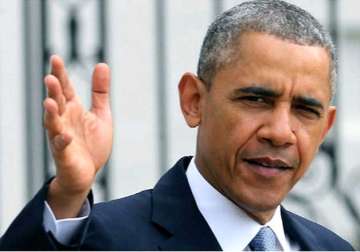Safe havens in Pak not acceptable: Obama
New Delhi: As he arrives in India for a three-day visit, his second in six years, US President Barack Obama has exuded hope about enhanced ties with "natural partner" India, saying he would like to
New Delhi: As he arrives in India for a three-day visit, his second in six years, US President Barack Obama has exuded hope about enhanced ties with "natural partner" India, saying he would like to think that the stars are aligned to finally realise his vision of the two countries being "global partners".
In an email interview with national weekly magazine, which is to be published in its upcoming issue, the US president, who arrives Jan 25, touched on several issues, including his relationship with former prime minister Manmohan Singh, acknowledging that the two countries have differences and can work around them, his appreciation of Prime Minister Narendra Modi's desire for wanting to take the relationship forward, and also the reason for accepting the invite.
Obama, who is the first US president to be chief guest at the Republic Day parade, also spoke strongly on terror emanating from Pakistan, saying that Washington has made it clear that “even as the US works with Pakistan to meet the threat of terrorism, safe havens within Pakistan are not acceptable and that those behind the Mumbai terrorist attacks must face justice”.
He said Modi's ”remarkable life story -– from tea-seller to prime minister -- is a reflection of the determination of the Indian people to succeed”.
Obama said Modi has a “clear vision of the big things he wants India to achieve, and I've been impressed with his energy and his readiness to address many of the barriers that have stood in the way of greater economic growth... In particular, I appreciate the prime minister's eagerness to take the India-us partnership to the next level”.
On former prime minister Singh, with whom he had interacted several times during bilateral summits, Obama said he had “a strong relationship with prime minister Singh, and he was a close partner”.
“Now, Prime Minister Modi's election and his commitment to a new chapter in the relationship between our countries gives us an opportunity to further energise our partnership.”
“I'd like to think that the stars are aligned to finally realise the vision I outlined in Parliament - India and America as true global partners,” he said.
“That's why I accepted the generous invitation to become the first US president to attend Republic Day as the chief guest,” he said and added that he was deeply honoured to join in celebrating the 65th anniversary of the Indian Constitution.
Acknowledging the differences between the two nations, the US president said: “No two nations agree on everything, and so, of course, sometimes India and the United States will disagree. But I believe that we can work through any differences in a spirit of mutual respect. Moreover, whatever differences we may have are greatly outweighed by the many interests we have in common.”
He said that for this, “good communication and coordination” is required not just between the leaders but between governments.
“When those of us at the leadership level agree on a course of action, our governments have to actually implement our decisions. We have to make sure that words are matched by deeds,” he said, in a tacit indication of the delay in implementation of the Indo-US civil nuclear deal. The deal was inked in 2005 and the US Congress approved of the 123 agreement bill and it was signed into law in 2008. But India's tough civil nuclear liability law, which puts the onus on suppliers, has held up implementation of the mega deal.
Obama also voiced keenness in working together with India in multilateral fora, saying no country can alone meet the challenges thrown up by the world. “That's why I'm committed to forging a greater partnership with India, both on a bilateral basis and within multilateral organisations."
“And even as we expand our cooperation on a bilateral basis, we have to keep working to make sure that multilateral institutions are effective. That's why I pushed for elevating the role of the G20 to give emerging economies, including India, a greater voice in global economic decision making. And that's why I believe that a reformed UN Security Council should include India as a permanent member.”
On ways to improve the bilateral relationship, Obama said the specific areas that both can improve ties in include creating jobs, improving education and creating more opportunities, including for girls and women. He called for reducing the barriers to trade, investment, and high-tech collaboration.
“American companies are ready to help build the infrastructure that will be the catalyst for the next wave of Indian growth,” he said and outlined other areas of cooperation including deeper security cooperation, including in maritime security in the Asia-Pacific, and climate change.
